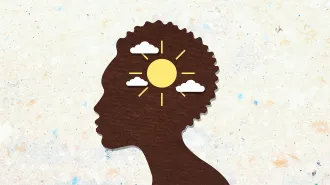Humans
Sign up for our newsletter
We summarize the week's scientific breakthroughs every Thursday.
-
 Archaeology
ArchaeologyThe world’s oldest piece of clothing might be an Ice Age–era hide from Oregon
Two pieces of elk hide connected by a twisted-fiber cord are the earliest evidence of sewing. But what they were used for is still a mystery.
By Tom Metcalfe -
 Anthropology
AnthropologyWhen the fish stop biting, ice fishers follow the crowd
Study showcases how modern-day foragers stick together when seeking food. Such social forces could help explain the emergence of complex thinking.
By Sujata Gupta -
 Animals
AnimalsA bonobo’s imaginary tea party suggests apes can play pretend
Apes, like humans, are capable of pretend play, challenging long-held views about how animals think, a new study suggests.
By RJ Mackenzie -
 Health & Medicine
Health & MedicineThe best way to help Alzheimer’s patients may be to help their caregivers
A mathematical model simulated patient outcomes when given caregiver support or an expensive Alzheimer’s drug to determine cost and health benefits.
-
 Health & Medicine
Health & MedicineGum disease bacteria can promote cancer growth in mice
In mice, the oral bacteria F. nucleatum can travel to mammary tissue via the bloodstream, where it can damage healthy cells.
By Meghan Rosen -
 Artificial Intelligence
Artificial IntelligenceAI models spot deepfake images, but people catch fake videos
A new study finds that humans and AI spot different kinds of deepfakes — hinting at the need to team up to fight them.
By Aaron Brooks -
 Psychology
PsychologyWith effort, procrastinators can change
Procrastination in young adulthood is not set in stone, though change is difficult, a long-term study shows.
By Sujata Gupta -
 Health & Medicine
Health & MedicineWidespread use of HPV shots could mean fewer cervical cancer screenings
A modeling study of Norway, which has high HPV vaccination coverage and uniform cervical cancer screening, suggests fewer screens could be needed.
-
 Health & Medicine
Health & MedicinePoor sleep may account for a large share of dementia cases
Researchers estimate that roughly 12 percent of U.S. dementia cases could be tied to insomnia.
-
 Health & Medicine
Health & MedicineTear gas and pepper spray can have lasting health effects
The chemicals are widely used for crowd control, but their long-term health risks are poorly understood.
By Nikk Ogasa -
 Neuroscience
NeuroscienceA study hints positive thinking could strengthen vaccine immunity
Thinking positive increased a specific brain region's activity and might have heightened immune response after a shot.
By Simon Makin -
 Health & Medicine
Health & MedicineGenes may shape how long we live more than once thought
New research challenges the view that human life span depends mostly on lifestyle. Genes may account for half the factors that determine longevity.
By Jake Buehler